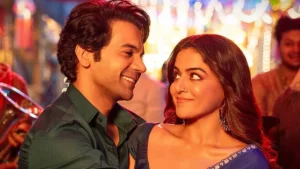
Vasan Bala’s Jigra is a brave film for Bollywood standards if we analyze its politics. I say analyze because the makers serve it to an audience that ought to be spoon-fed with exposition and lines. The film opens in a capitalistic family setup where siblings Satya (Alia Bhatt) and Ankur (Vedang Raina) feel out of place. It soon shifts base to a fictitious, autocratic nation called Hanshi Dao – a mix of North Korea and Brunei with the technological prowess of Singapore. The system is unrelenting, and the cops are oppressive. A group tries to fight it with a slogan that the film translates to ‘Inquilaab Zindabad’. And yes, Satya is out on the streets to get her brother out of prison.
Alia Bhatt’s Satyabhama is an ‘Angry Young Woman’ – a female version of ‘70s Amitabh Bachchan – whom the film references repeatedly (sometimes apt, mostly forced). Vasan Bala does not believe in saying things aloud except for vintage movie references and songs. In a film designed on the lines of Salim-Javed potboilers in terms of logic, the personal equations do not register. We get flashbacks, and Satya looks at people suspiciously to speak cryptic lines. The universe is such that there’s no Nirupa Roy or Manorama here to spell things out. We know there’s something wrong, but the enormity of this wrongness is never established.
A major crisis hits Ankur when his privileged brat of a buddy makes mischief in an autocratic Southeast Asian nation. The ridiculousness of this plot point will leave you stumped for a while. Even more distressing is how Ankur decides to confess something he hasn’t done. The seemingly bright 21-year-old guy turns into an absolute dimwit in less than a minute.
Jigra gets more characters once Satya is in town to rescue her baby brother. To land their sibling bond, the filmmaker unsuccessfully blares the song ‘Phoolon ka taaron ka’ in bits and pieces. Meanwhile, the country is also in a state of political unrest that is, perhaps, more exciting than the bhai-behen saga Jigra wants to be. Yet, the revolution bit does not land with force until the last scene with the prison inmates. Satya’s planning before the big jailbreak is straight from the ‘80s, and the culmination set in international waters is unintentionally funny. Yet, the wonderfully chaotic pre-climactic sequence is the money shot. At some point, you forget it is a part of a film as dull as Jigra.
ALSO READ: ‘Mard Ko Dard Nahi Hota’ review – a whacky tribute to potboilers from the VHS era
Alia Bhatt takes up a physically daunting task here. She does best in (about) three dramatic scenes, interspersed with minor action, intense close-ups, and circular dolly tracks (DOP: Swapnil S. Sonawane). Vasan Bala’s film, this way, is most fun when its know-it-all heroine is having fun. So much so that I nearly yelled “Go, Alia, go,” forgetting the existence of a screen-brother. That said, Bhatt’s Satya is a bland gender reversal of a familiar template but sans any soul. I could never connect with Satya’s protective streak despite the flashback recalls and film-inspired dialogues at all stages of her life. She is not tough enough to naturally belong in the Bachchan space, and the film does not allow her to catch a break.
Vedang Raina does the dude-in-distress act quite well, yet there’s not much he could have done to conceal the lack of nuance. The supporting cast is a celebration of stock characters – most of whom do what you predict them to. Manoj Pahwa is miscast as Bhatia and Rahul Ravindran’s Muthu is cut out of clichés. The latter talks like a regular Indian when he wants to help Alia, and at other times, he ends his lines with a ‘La’ to highlight his patriotism (for Hanshi Dao, not India). As the only key supporting actor who impresses, Vivek Gomber spells menace as a rigid cop – emulating an “angrezon ke zamane ke jailer”.
Jigra wishes to be explosive, and with the number of loopholes and contrivances on paper (Vasan Bala, Debashish Irengbam), Vasan Bala’s enthusiastic direction falls flat. The result is a tiring drama that saturates itself with arbitrary thrills and pop culture references. Alia Bhatt’s film also reminded me of Ravi Udyawar’s Mom where the leading actor had a blast even as the film went south. The only difference is that Sridevi never appeared fatigued the way Bhatt does. The progressive politics of the film shows capitalists, police, and dictators exactly as who they are – oppressors. Despite such earnest intentions, Jigra ends up as a mixture of unpalatable ingredients that seldom knit together – such as Bhatia‘s tendency to play loud music in tense situations. Particularly in the absence of a male romantic lead, Jigra emerges as a mini case study on why we need bold heroines like Satya – but in better films.
Rating: ★★ 1/2

